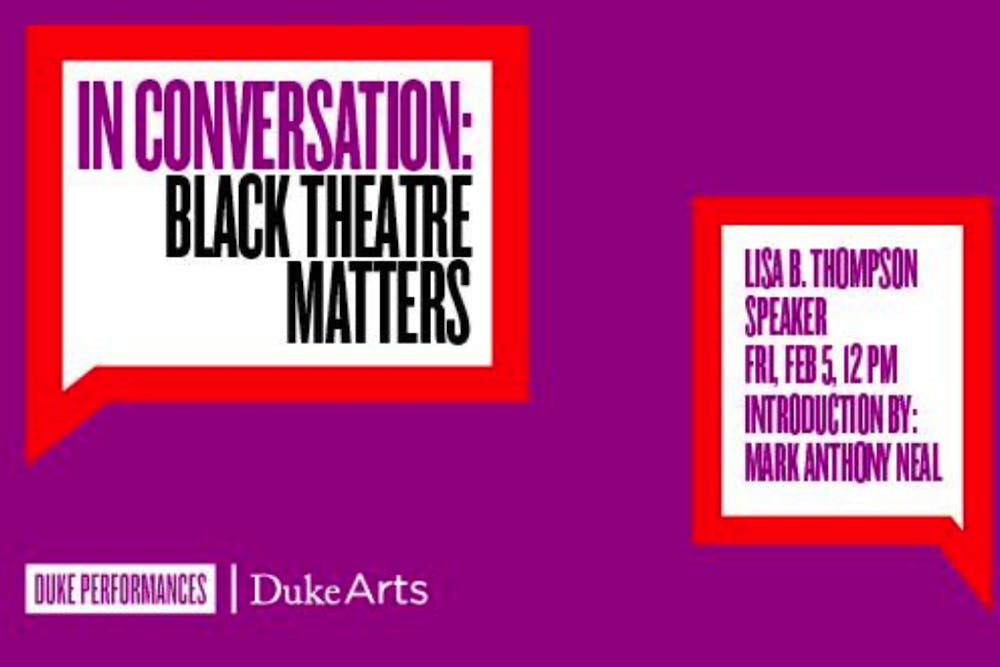Art can quicken your pulse — literally. In a study from UCL, the heartbeats of strangers synchronized during a live theater performance, rising and falling according to narrative arcs. While the COVID-19 pandemic limits in-person performances, Zoom can still offer a taste of that excitement and a window into the world of ideas around art.
This spring, “In Conversation,” a collaborative series from Duke Arts and Duke Performances, will engage artists and Durham community members in dialogue about the arts. Twelve free virtual lunchtime talks, hosted Fridays at 12pm, will feature world-renowned artists of poetry, music, dance, visual arts and theater. According to Bobby Asher, Director of Duke Performances, last semester’s series attracted an especially expansive and geographically diverse audience.
“Duke Performances is an organization that builds a bridge between the campus and the community,” Asher said. “And we've been heartened to see from the fall the amount of response we've gotten from the community. Online… our audience is not limited to Durham and Duke. We've had people tuned into these conversations from Italy, from other places across the world and other states around the U.S.”
This upcoming spring will feature guests who engage with pressing social issues. Singer-songwriter Natu Camara will discuss her career and her activism in support of women in West Africa March 19; a Bass Connections project team will present its research on arts-based interventions for environmental advocacy in North Carolina April 2. In addition, Katie Crutchfield of Waxahatchee, whose 2020 indie rock album “Saint Cloud” topped several year-end rankings, will talk with Pinhook proprietor Kym Register about themes in her music and her Southern roots.
The list continues. “Tift Merritt and Alison Russell are doing this amazing project around this series of photographs from an African-American hospital in North Carolina,” Asher said. “Amir Sulaiman is an extraordinary poet and at the leading edge of talking about the experience of Black Muslims in America. All of these artists have something to say that they certainly say through their performance and through their work, but we also want to give them an opportunity to dig in-depth in a conversation.”
The next opportunity to attend a conversation is Friday, Feb. 5, when scholar-artist and playwright Dr. Lisa B. Thompson will talk with Duke professor Mark Anthony Neal on the topic “Black Theater Matters.”
Thompson, who cited the UCL study as profound evidence of the power of theater, said she expects to “give a sense of the importance of Black theatre in terms of African American culture and politics in the present, with context from the past as well, in a continuum of interventions from theater artists, playwrights, directors and institutions to forward the cause of Black humanity and dignity — and be entertaining.”
To be at once a working artist and an art scholar is not common, yet Thompson managed to simultaneously navigate graduate school and the release of her first play, “Single Black Female,” which has since received numerous accolades and run for over 20 years. Today, Thompson continues to write plays while working as a professor of African and African Diaspora Studies at UT-Austin.
“Theater is a way for people to get all the things I want them to understand in a 200-page scholarly book in a 90-minute play that has them laughing,” Thompson said. “So I use humor to disarm, and to get people to be receptive to what I'm trying to explain or share in terms of history.”
Thompson’s interest in both the visceral and intellectual impacts of performance befits the spirit of the “In Conversation” series. In a time when many artists are struggling and crises are stretching across the globe, it is important to carry on the conversations sparked by art and support local artists.
“The idea that the arts are frivolous should be, after the pandemic, clearly a fallacy if everyone's been stuck to their screens, streaming like crazy,” Thomson said. “All these cultural producers are providing the content and keeping the whole planet afloat telling the stories that make us feel like more human, and more connected… What we need right now, in this country, is to synchronize our hearts a little bit so we can tackle some of our problems honestly.”
Get The Chronicle straight to your inbox
Sign up for our weekly newsletter. Cancel at any time.

